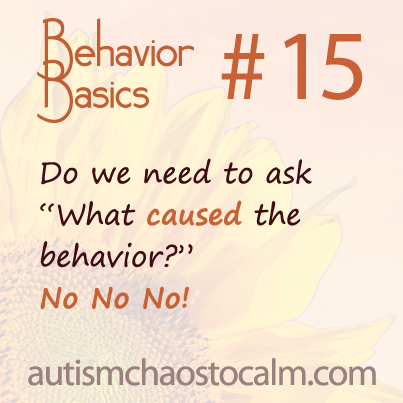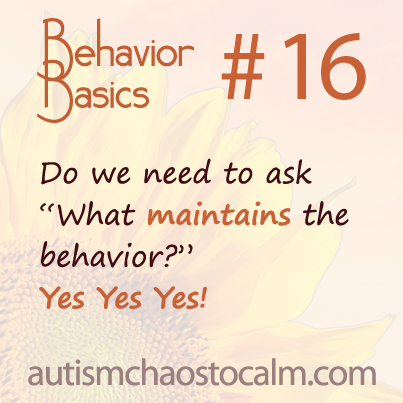Behavior Basic #15: Do we need to ask “What caused the behavior?” No No No!
When dealing with any problem, it’s always important to ask the right question. We know from Behavior Basic #11 that the CONSEQUENCE, not the antecedent, determines the future course of a behavior. In the early years when I was struggling with my child’s difficult behaviors, I kept asking myself, “What is causing this?” It was the wrong question. By focusing on the wrong question I couldn’t come up with a solution.
It’s important to be aware of factors that trigger behaviors, such as hunger, fatigue, or stress, but we can’t control our children’s environment. We can only control how we respond to a child’s behavior. And we respond by deciding what the consequences should be. If we know that positive consequences increase behaviors, we can stop accidentally giving positive consequences (attention, treats, privileges) for undesired behaviors and train ourselves to give these only for desired behaviors.
Behavior Basic #16: Do we need to ask “What maintains the behavior?” Yes Yes Yes!
This is the right question to ask. When a child does something, think about what happened after the behavior. If the child experienced a consequence that was useful to him, the behavior will occur again. Please note, the consequence may not seem pleasant to us, but if the behavior keeps happening then the consequence was positive for the child. It is well known that children sometimes misbehave to get attention because a scolding is better than being ignored.
We know from Behavior Basic #12 that a pleasant consequence maintains a behavior–keeps it going. So, the right thing to do is to monitor the consequences we deliver to our kids after they do something. The right thing to do is to provide pleasant consequences for behaviors we like, and to ignore behaviors we don’t like. (Of course, if a behavior is dangerous or destructive, we have to step in, take charge, and re-direct the child.) This may seem awkward and unnatural at first, but after a while it becomes easier. The reward for taking charge of the consequences we deliver is an increase in desired behaviors in our children.
REMINDER: This concludes the wrap-up of Behavior Basics for the week. Please remember the schedule: On the release date of each module, the Behavior Basics for that module will be compiled into a PDF ebook available from our blog and Facebook page. Click on this link to download the entire series of 42 Behavior Basics for free: http://statictab.com/m7bizwt.

